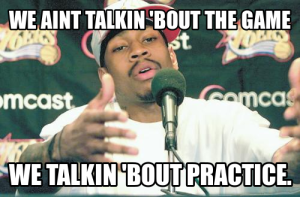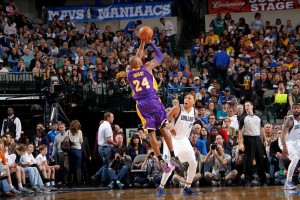As a kid, I always wanted to be the best at everything. Whether it was athletics, academics, or just Pokemon training, I desired to be number one. It wasn’t until middle school where I was presented with a rule that changed my perspective of success: the 10,000 hour rule. This rule, which was made famous by Malcolm Gladwell in his book, the Outliers, states that to master a skill of choice, it requires at least 10,000 hours of persistent practice. I remember going home and pushing 10000 divided by 24 on my calculator. “It’s only going to take me 417 days of basketball practice for me to become the next Kobe Bryant!” As time went on, my dreams altered and changed. However, the question still lingered: How valid was the 10,000 hour rule? Will spending 10,000 hours on something diligently make me one of the best?
The idea of practice has dominated the discussion on whether success is inherited or self developed. A study on violin students was conducted in the early 1990s by group of German psychologists. All of the students in the study were asked approximately what age did they start playing, to which most to all responded with the answer, five. As time went on, the psychologist observed their practice schedules until they hit the age of twenty. Surprisingly, the violinist who were elite had practice an average of more the 10,000 hours, while the less proficient practiced a mere 4,000 hours. Based off the study, the researches has found a statistical relationship between deliberate hours of practice and ability to succeed. Another study I found completely contradicts the 10,000 hour rule, stating it is invalid. By three professors the study has “found that deliberate practice explained 26% of the variance in performance for games, 21% for music, 18% for sports, 4% for education, and less than 1% for professions.” Practice does not necessarily mean perfect, and the study offers a counter that supports people’s inner ability to perform certain tasks. Aside from the differences, both studies do acknowledge that people tend to get better through practice. “The question is whether that is all there is to it.” (Hambrick, Zachary)
A person that immediately popped in my mind as I read both studies was Jahlil Okafor, a NBA rookie currently signed with the Philadelphia 76ers. I had gone to the same high school as Okafor, and everyday, he would tower over the student population. Realistically speaking, I can practice basketball for 10 years straight, and still not be able to compete due to his physical attributes. Thus, I feel that the 10,000 hour rule is invalid. Certain people are born with traits that give them an advantage over competition. Another example that disproves the 10,000 hour rule is Kim Ung-Yong. Kim was a child prodigy and “was able to read Korean, English, Japanese, and German by the time he was three.” Though I am not confident what my body can do, I am sure certain things cannot be obtainable just by pure practice. Either you have it, or you don’t.
Concluding, I strongly believe that the 10,000 hour rule is invalid and is disproven from the supernatural cases we see all over the world. Child prodigies and freakish athletes are prime examples. However, I do believe that practice is necessary to hone one’s skills to their fullest potential. As a painful as it is, unless one is genetically blessed, there is no way one can be the best at a certain profession. Maybe that is why we hear, “Be the best person you can be.”
- http://www.12hourstolive.com/10000-hours-mastery-genius-practice/
- http://variable-m.com/formula-genius-10000-hour-rule/
- http://www.slate.com/articles/health_and_science/science/2014/09/malcolm_gladwell_s_10_000_hour_rule_for_deliberate_practice_is_wrong_genes.html
- http://www.princeton.edu/main/news/archive/S40/43/14C80/index.xml?section=topstories




There are definitely many external factors that influence talent. 10,000 hours of practice will you make you good at whatever sport you are practicing for. However, I find that the quality of practice is more important than the quantity. I am an avid golfer, and I have read books from the sports psychologist, Bob Rotella. He heavily emphasizes the importance of practicing “well” rather than for a long time. I have never lacked in terms of time commitment to golf, but once I began to focus more on how I was practicing, I saw drastic improvement. Therefore, I do not believe you can put a time on how much practice will make you great.
I wrote about a very similar topic, only mine focused more on muscle memory and how it relates to music. Though I do understand your perspective regarding the 10,000 hour rule due to the examples you provided, I have to disagree with your opinion. It’s true that you might not be the best still, but you would still be mastering the sport of basketball if you practiced for 10,000 hours. I think the 10,000 rule has to do more with individually mastering something rather than just being the best at something. Of corse people are born with natural abilities, but it doesn’t mean that other people can’t become just as good overtime.
This link might give you a new perspective about the 10,000 hour rule because it is look upon through music rather than sports.
The 10,000 hour rule does not matter in my opinion. Like you said, Jahill Okafor was blessed with the physical attributes and athleticism in order to become a NBA player. An expression in the sports world is “you can teach a player to use his size, but you can’t teach size.” To be successful in the sports world in my opinion, it takes a combination of genetics, talent, and a little bit of luck